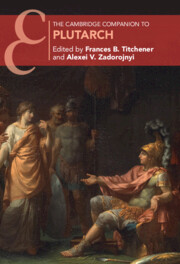Book contents
- The Cambridge Companion to Plutarch
- The Cambridge Companion to Plutarch
- Copyright page
- Contents
- Figures
- Contributors
- Acknowledgments
- Introduction
- Chapter 1 Plutarch and Biography
- Chapter 2 Romanness and Greekness in Plutarch
- Chapter 3 Plutarch As Moral and Political Educator
- Chapter 4 In the Spirit of Plato
- Chapter 5 Plutarch As a Polemicist
- Chapter 6 Religion and Myth in Plutarch
- Chapter 7 Plutarch at the Symposium
- Chapter 8 Language, Style, and Rhetoric
- Chapter 9 Plutarch and Classical Greece
- Chapter 10 Great Men
- Chapter 11 Thinking “Private Life”
- Chapter 12 Wealth and Decadence in Plutarch’s Lives
- Chapter 13 Plutarch and the Barbarian “Other”
- Chapter 14 Plutarch and Animals
- Chapter 15 Plutarch in Byzantium
- Chapter 16 Plutarch in the Italian Renaissance
- Chapter 17 Plutarch and the Spanish Renaissance
- Chapter 18 Plutarch and Shakespeare
- Chapter 19 Plutarch in France
- Bibliography
- Appendix: Plutarch’s Moralia
- Index Locorum
- Index
- Cambridge Companions To …
Chapter 18 - Plutarch and Shakespeare
Reviving the Dead
Published online by Cambridge University Press: 29 June 2023
- The Cambridge Companion to Plutarch
- The Cambridge Companion to Plutarch
- Copyright page
- Contents
- Figures
- Contributors
- Acknowledgments
- Introduction
- Chapter 1 Plutarch and Biography
- Chapter 2 Romanness and Greekness in Plutarch
- Chapter 3 Plutarch As Moral and Political Educator
- Chapter 4 In the Spirit of Plato
- Chapter 5 Plutarch As a Polemicist
- Chapter 6 Religion and Myth in Plutarch
- Chapter 7 Plutarch at the Symposium
- Chapter 8 Language, Style, and Rhetoric
- Chapter 9 Plutarch and Classical Greece
- Chapter 10 Great Men
- Chapter 11 Thinking “Private Life”
- Chapter 12 Wealth and Decadence in Plutarch’s Lives
- Chapter 13 Plutarch and the Barbarian “Other”
- Chapter 14 Plutarch and Animals
- Chapter 15 Plutarch in Byzantium
- Chapter 16 Plutarch in the Italian Renaissance
- Chapter 17 Plutarch and the Spanish Renaissance
- Chapter 18 Plutarch and Shakespeare
- Chapter 19 Plutarch in France
- Bibliography
- Appendix: Plutarch’s Moralia
- Index Locorum
- Index
- Cambridge Companions To …
Summary
The vision of the Republic that emerges from Shakespeare’s plays is a tragic one: fought over and lost in Julius Caesar and Antony and Cleopatra; perhaps, in Coriolanus, just too hard to live with. At the end of Shakespeare’s dramatic career, he left all this behind, and he returned to a fanciful, allusive use of Plutarch – the Greek Lives, rather than the Roman. We find Plutarchan names cut loose from their histories: Pericles, Prince of Tyre (in the sources the character was called “Apollonius”); Cleomenes and Dion, courtiers in The Winter’s Tale. In the last play of all, the collaboratively written Two Noble Kinsmen, Duke Theseus returns, together with the Cretan labyrinth: the play suddenly, decisively echoes North’s wording from the Theseus. Plutarch has ceased to be a deep “source”; he is now, again, a fund to dip into, a resource; perhaps, by this time, an old friend.
- Type
- Chapter
- Information
- The Cambridge Companion to Plutarch , pp. 357 - 382Publisher: Cambridge University PressPrint publication year: 2023

